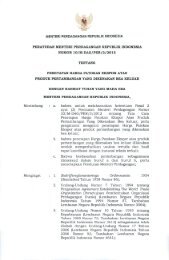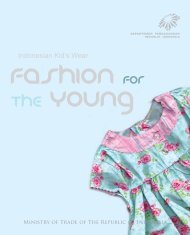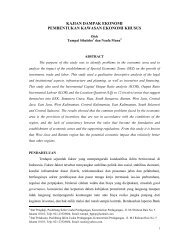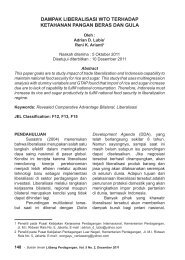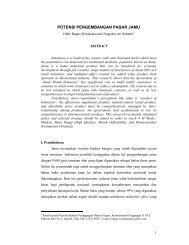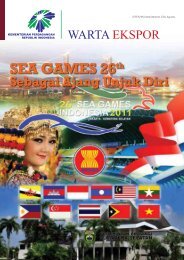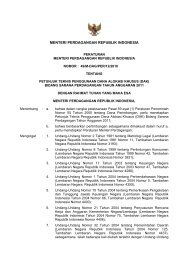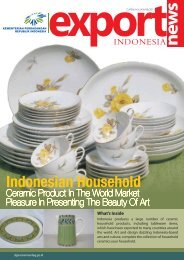Indonesia
Indonesia
Indonesia
Create successful ePaper yourself
Turn your PDF publications into a flip-book with our unique Google optimized e-Paper software.
To achieve a recognized position in the global market, creativity and innovation should<br />
be added with advanced technology mastery, with which product improvement<br />
depends upon. Advanced technology at most times determines standards of certain<br />
products, i.e. a product that uses non-toxic, biodegradable resin as adhesive substance<br />
could gain the label of ‘ecological product’ and could enter certain market, while similar<br />
products that uses common resins fail to gain the label and therefore are not allowed to<br />
be distributed in these particular market.<br />
Today, the Government of <strong>Indonesia</strong> has been persistence in implementing policy to<br />
expand the access of <strong>Indonesia</strong>n designers to the necessary information, knowledge,<br />
technology and resources, particularly in the remote areas of <strong>Indonesia</strong>’s vast<br />
archipelago. The GoI also enhancing the country capacity to accommodate law<br />
enforcement in recognizing intellectual copyright.<br />
<strong>Indonesia</strong> Law number 31 year 2000 on Industrial Design provides intellectual copyrights<br />
protection for an industrial design. It is stated in the institution that industrial design is:<br />
a creation of form, configuration or composition of lines or colors or lines and colors<br />
or a combination of line and colors in three-dimensional or two-dimensional, which<br />
provides an aesthetical impression and can be used to produce a product, a good, an<br />
industrial commodity or a craft work.<br />
Protection is provided for industrial designs that are: new and considered new (based on<br />
the registration date). Protection is not available for industrial designs that are against<br />
effective law, public order, religion and ethics.<br />
The law provides a term of ten years protection of the rights, dated since the acceptance<br />
of the design, including: the rights to possess the design and to prohibit others without<br />
permission to produce, use, sell, import, export and/or distribute a part or more of a<br />
design that has already given the copyrights. The subjects of the law are designers,<br />
whether individually or as a team, or persons that are appointed as the beneficiary of<br />
the rights, institutions and commissioners.<br />
The Law is currently undergoing a process of amandement, in order to determine more<br />
clearly the definition and scope of “industrial design” that is appropriate for <strong>Indonesia</strong>.<br />
Advancement Through Education<br />
The first higher education in industrial design was first established in Institute of<br />
Technology Bandung in 1972, under the name of Product Design Studio. In 1996 the<br />
studio applied and was registered as a member of International Council of Society of<br />
Industrial Design (ICSID). In 1998 the Product Design Studio raised its level to be Product<br />
Design Study Program (PSDP), accompanied by improvements in curriculum and<br />
strategies in order to face future challenges.<br />
Up to today, higher education in industrial design gradually increases in various cities in<br />
<strong>Indonesia</strong>. Among the largest ones are at Trisakti University, Paramadina University and<br />
Pelita Harapan University (UPH) in Jakarta, Institut Teknologi Sepuluh Nopember (ITS) in<br />
Surabaya and Institut Teknologi Nasional (Itenas) and Maranatha University in Bandung.<br />
CREATIVE & INNOVATION INDONESIA<br />
29<br />
produk rev akhir.indd 29<br />
4/7/2009 6:11:42 PM



